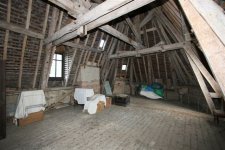PreferrablyWood
Member
- Joined
- Sep 8, 2013
- Messages
- 972
After much research on the Systainer madness I started widening my view and looking around on what my next job entails, So I've re ordered my list, I will wait on getting some Systainers and the Syslite KAL 2 l and get the RO 90 DX abrasives and the Sys-Roll instead because I find I'm in a do or die situation; really! To get this coming job done before the really bad weather sets in late November I really have got to get cracking, My metabo SX E 400 80mm sander was going to be the most used tool for that job, but after the wise Fogarian "Neeleman" pointed out how much better the Festool RO 90 is and me subsequently finding out that the 80mm size of the Metabo has a very limited choice of abrasive types, I have just decided to go for the RO 90 with 100 free sheets of 120 Gr granat and buying 50 pieces each of 60 Gr and 80 Gr and 100pcs 180 gr Granat. It's a bitter pill to swallow that I really should have went with the Festool sander in the first place, but I live and I learn.. oh well I'll do the Systainer organization thing a little more gradually than planned, wait on getting the Sys-Roll and the SysLite and the finer grade abrasives for my RS 300..
Of course it's always nice to get a new tool than all those other accessory type items which can help some organization issues etc, in this situation it just makes more sense...
Of course it's always nice to get a new tool than all those other accessory type items which can help some organization issues etc, in this situation it just makes more sense...



